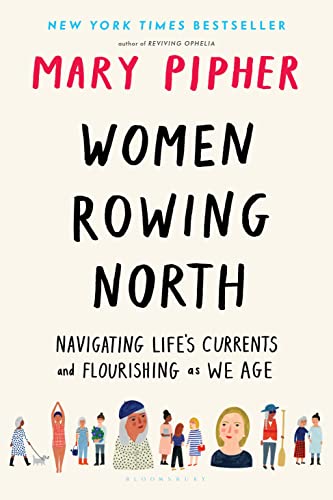Women Rowing North: Navigating Life’s Currents and Flourishing As We Age

"Mary Pipher dives in and upends the myths of female aging by detailing both the joyous and depressing truths of our sunset years."
In Women Rowing North, Mary Pipher dives in and upends the myths of female aging by detailing both the joyous and depressing truths of our sunset years. She gives us a bird’s eyeview of growing old through a kaleidoscope of women’s stories and by sharing her own experiences and emotions as she enters the final decades of her life. The themes of the book—how to cope, grow, heal and change late in life—emerge as Pipher weaves snippets of interviews with women of varying older ages, ethnicities, personalities, and situations into her exposition.
Her intent is to write “a guidebook for the flourishing that is possible” for women in their 70s and beyond, a time that can be as debilitating and heartbreaking as it can be satisfying and exhilarating. Pipher rightfully rages against how, since the beginning of time, older women have been painted into dark or colorless corners, and she rejoices in their using wisdom born of experience to paint themselves back out, sometimes in glorious technicolor. Pipher insists that finding one’s authenticity is one of the best gifts of aging and delights in the fact that “we become who we believe we can be.”
She points out how “Young people do not understand older people because they have never been old,” an obvious truth, and one that both old and young would do well to remember. She is insistent that older women need to share their considerable wisdom by “educating other people about the negative stereotypes and the reality of our lives”—advocating for women across the life span and connecting with people of all ages, rather than cocooning themselves with women their age.
Pipher lays out an unvarnished, balanced landscape of women’s final decades. Pluses abound. Older women often are healthier and more active than men their age. They are closer with friends and family. They are wiser, with a wider frame of reference for everything that happens to them and those who share their lives.
They have seen it all, or most of it, anyway. Now that the future is rapidly approaching or has arrived, they take things a day at a time, the way they have always been advised to do. They no longer need to wonder and worry who they will become because it is who they are now, and the only developmental task left is for them to come to terms with this final self.
But, as Pipher says, and it is a point she makes repeatedly in the book, “We don’t become our wisest selves without effort.” She fervently believes that we need to stop fighting the suffering that abounds in every life and, instead, grow from it. This is far from a new thought, but it is worth keeping in mind. Another is to know the difference between loneliness, which is unwelcome, and solitude which is both comfortable and satisfying.
The book does not minimize the despair, physical suffering, grief, and anger of growing old, as our minds and bodies deteriorate in ways that sometimes make us unrecognizable to ourselves. Equally, however, Pipher reminds us how pointless it is to dwell on either emotional or physical pain. Instead, she urges women to reach out to old friends and make new ones, find meaning in life through giving back or, finally, taking care of self, loving others, and making peace with what is. Even in grief, she contends, we can find something valuable to hold on to that will get us through our darkest hours.
If there is one concept that Pipher’s book is trying to instill in women as they reach their seventies, it is self-acceptance. To be their best selves, she encourages them to settle old scores with the universe by showing mercy to themselves and to others. She urges them to remember the parts of the past that are useful for a better present and to stop fretting about tomorrow. If they can do this, as they go on living while moving toward dying, their days will be rich and their minds will be at peace.
Although Pipher’s message to her sisters is to make the best of their final decades, readers may find parts of the book depressing rather than enlivening. Though she writes beautifully and encourages women to lighten their load by laughing at themselves, Pipher’s tone is serious and the book is a bit plodding. She is right that we need to take charge of our lives and not give in or up as it draws to a close. Speaking of our final decades, she says, “I hope that we can experience bliss.” What she means is that in spite of the inescapable pain that aging will bring us in one form or another, she hopes that we can rise above it.